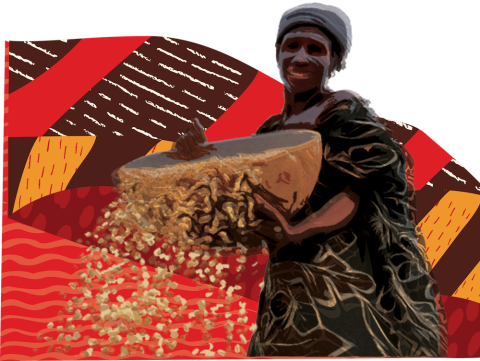Discover hidden stories and unheard voices on land governance issues from around the world. This is where the Land Portal community shares activities, experiences, challenges and successes.
 Follow our
Follow our
Sustainable Development Goals
Blog Series!
Interested in land corruption?
Follow our Land & Corruption Blog Series
for in-depth perspectives from the experts.
Issues
Geographical focus
On March 5, 2025, the FAO and the Global Land Alliance launched an important study titled Collective Tenure Rights and Climate Action in sub-Saharan Africa. This study consolidates extensive research on how collective land tenure arrangements impact forest conditions, biodiversity, and the livelihoods of Indigenous peoples and local communities across the
Photo: Youth in Rwanda engage in a Q & A session (Creative Commons Attribution)
Razina is different. Unlike most people in Madagascar, his skin is pale. His hair is blonde and his eyes are a light shade of pink. Razina has albinism.
He became aware of just how different he was at a very early age. When he arrived at school for the first time, all the other children teased and harassed him. The bullying continued throughout his time at school. “They treated me as less than human, like a dog,” he recalls.
Despite being a part of national government planning, large-scale agricultural investments in Ethiopia have not been meeting expectations. Focusing on Gambella region in southwestern Ethiopia, this policy brief examines the reasons why, and proposes three policy actions to improve the situation.
Three policy actions required
This blog post is part of the series What to Read.
As humanity grapples with understanding the causes and consequences of the mounting climate crisis, there can be a tendency to oversimplify issues in a bid to identify solutions. Such oversimplifications have stemmed from a broad-brush analysis which identifies all livestock production and animal products as key drivers of climate change.
Daily Maverick Our Burning Planet: Op Ed by Malik Dasoo
Regenerative agriculture, which involves special techniques to cultivate nurture-rich soils that also trap greenhouse gases, can initially be time and labour intensive. But farmers who stick with it are witnessing enormous returns.
Almost ten years ago, global donors who were focused on the role of land and property rights in promoting economic growth, mitigating food insecurity, and addressing climate change issues, came together in a United Nations (UN) body to negotiate an international agreement for voluntary guidelines to strengthen and secure land rights.
Private financial flows that are tracked against certain Environmental, Social and Governance (ESG) criteria reached record highs in 2020. But this boom may not be having a material impact, especially in low-income countries (LICs) which are most in need of it. Identifying and managing unknown financial risks can help re-balance the risk-reward ratio for sustainable investors.
The Maasai community of Musul have lived on the same land in Laikipia county for generations. It is their source of food and water, the heart of their culture and beliefs, and their ancestral home. But until recently, their legal rights to govern it were tenuous.
WHY REJECT CUSTOMARY LAND PRIVATISATION
Most of the world’s land is still stewarded by communities under customary systems. Billions of people rely on communally managed farmland, pasture, forests and savannahs for their livelihoods.
This collective management of resources is viewed in the colonial or capitalist economic model as an obstacle to individual wealth creation and private profit.






